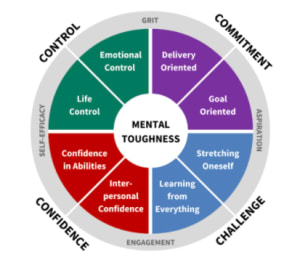
Mental Toughness- Similar to hardiness, mental toughness is a multidimensional construct composed of resiliency, confidence, commitment, concentration skills, pressure seeking, and effective coping (Connaughton, Hanton, & Jones, 2010; Crust, 2008; Sheard, 2009). Mentally tough people have been found to use problem-focused strategies that require engaging in behaviors aimed at eliminating the problem, when control is possible (Nicholls, Polman, Levy, & Backhouse, 2008). Mentally tough people demonstrate lower levels of negative emotional states (Gucciardi & Jones, 2012). “Mental toughness represents a constellation of positive psychological variables that buffer against stressors, allowing individuals to perform consistently well regardless of situational factors” (Clough, Earle, & Sewell, 2002). Mental toughness allows people to keep moving forward when barriers and stressors try to stifle their progress. Mentally tough athletes more consistently stay determined, focused, confident, and in control (Robbins & Madrigal, 2017). Specific attributes were identified by Jones et al. (2002) and included the following: An unshakeable belief in one’s ability to achieve goals, A strong determination to succeed, allowing one to recover from setbacks, A belief in one’s abilities in comparison to others, Insatiable desire and intrinsic desire to achieve, Ability to focus on the task regardless of distractions, An ability to push beyond physical and emotional pain while putting forth consistent effort and technique, The ability to recognize and cope with performance anxiety, The ability to persist consistently regardless of opponents’ successes and failures, Thriving on the pressure of competition, Remaining fully focused in the face of personal distractions, and Having the ability to shut off when one is done with the performance So how can we build our mental toughness? Clough and colleagues (2002) proposed the 4 Cs model of mental toughness, which includes commitment, control, challenge, and confidence. Having all four qualities in combination is the key to success. Mental toughness starts when you choose to take notice of what is passing through your mind, without identifying personally with those thoughts or feelings. Developing mental toughness requires self-awareness and commitment. Mental toughness can be cultivated via will-power, discipline, and hard work. Education is the best way to cultivate these concepts. During your workouts you can strive for 4 key tips (Ross, 2018): Connect to your why. With a deep, meaningful purpose, people are much more willing to tolerate discomfort. “With a strong why, you will figure out any how. And mental toughness is all about embracing how you endure.” Find a way, not an excuse. Know that willingness and optimism are regulated by self-talk. “Be mindful of the messages in your mind and realize that you can change your thoughts. You can use the power of self-talk to engage in both willingness and optimism throughout your workout.” Train purposefully in unpleasant conditions. Switch up the times or environments you train in. “Starting at an inconvenient time when you may not feel fresh will train your mind and body to work through uncomfortable situations and help you hone both willingness and optimism.” Practice daily. It can be something as small as taking a cold shower. Developing a tolerance for uncomfortable situations each day helps teach you the connection between an unpleasant physical experience and your psychological reaction to quickly escape or avoid. Ultimately, the characteristic of mental toughness helps people prepare for difficult and uncomfortable situations. Instead of turning to run or avoid these situations, they consciously make the decision to physically stick it out to get them that much closer to their goals. -Caleb Campbell, M.S.- NASM Certified Personal Trainer NASM Certified Behavior Change Specialist #mentaltoughness #stressresistance #gotimetraining



